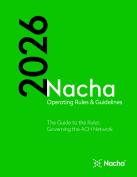Reversals and Enforcement
The overarching purpose of these two Rules is to deter and prevent, to the extent possible, the improper use of reversals and the harm it can cause.
The two Rules explicitly address improper uses of reversals, and improve enforcement capabilities for egregious violations of the Rules.
The Enforcement rule became effective January 1, 2021, and the Reversals rule became effective June 30, 2021.
Details
Reversals
This Rule explicitly address improper uses of reversals. It expands the permissible reasons for a reversal to include a “wrong date” error – 1) the reversal of a debit Entry that was for a date earlier than intended by the Originator, or 2) a credit Entry that was for a date later than intended by the Originator.
The Rule establishes formatting requirements for reversals, beyond the current standardized use of the Company Entry Description field (“REVERSAL”):
-
The Company ID, SEC Code, and Amount fields of the reversal must be identical to the original entry
-
The contents of other fields may be modified only to the extent necessary to facilitate proper processing of the reversal
-
This is the same approach as the formatting requirements for Reinitiated Entries
In addition, the rules explicitly permit an RDFI to return an improper Reversal:
-
R11 for consumer accounts, 60-day return timeframe upon receiving a consumer claim
-
R17 for non-consumer accounts, 2-day return timeframe
-
An RDFI will be permitted to use R17 to return an improper Reversal that it identifies on its own (i.e., not based on a customer contact), 2-day return timeframe
Enforcement
This Rule defines an Egregious Violation as:
-
A willful or reckless action, and
-
Involves at least 500 Entries, or involves multiple Entries in the aggregate amount of at least $500K.
The Rule also allows the ACH Rules Enforcement Panel to determine whether a violation is egregious, and to classify an Egregious Violation as a Class 2 or 3 Rules Violation.
-
The sanction for a Class 3 violation can be up to $500,000 per occurrence and a directive to the ODFI to suspend the Originator or Third-Party Sender
In addition, the Rule expressly authorizes Nacha to report Class 3 Rules violations to the ACH Operators and industry regulators.
Technical
Impact
Reversals
Benefits
Originators, Third-Party Senders, and ODFIs have a clearer and more consistent understanding of when NOT to initiate reversals; in particular, with regard to the failure to fund an ACH credit file.
The ability for RDFIs to return improper reversals will become more efficient. Recourse for improper reversals will be able to be handled through the ACH return process.
Impacts
ODFIs, Originators, and Third-Party Senders may want to review practices, policies, and controls regarding reversals.
RDFIs that want to take advantage of the return process may need to establish policies and practices that facilitate the return of an improper reversal.
Enforcement
Benefits
Nacha will have the authority to better enforce the Rules for egregious violations. More significant enforcement will be available to be used in cases involving outlier violations.
Lessens the risk to all ACH Network participants of experiencing egregious violations.
Impacts
Participating DFIs should be aware of the changes to Nacha’s enforcement capabilities and should consider updating and educating their customers on the changes to and potential impacts of the enforcement process.
FAQs Section
REVERSALS
Do the upcoming rule changes to Reversals provide additional time for an Originator or ODFI to initiate a Reversing Entry?
No. The new rules do not impact the timing for the initiation of a Reversal. An Originator or ODFI must still transmit a Reversal in such time that it is made available to the RDFI within 5 banking days following the Settlement Date of the Erroneous Entry.
The new rule expands the permissible reasons that an Originator or ODFI may initiate a Reversing Entry. What has changed?
In addition to existing reasons for the origination of a Reversing Entry (i.e., duplicate entry, incorrect receiver, incorrect dollar amount, or certain PPD credits related to termination/separation from employment), an Originator or ODFI may now also initiate a Reversal when it has transmitted a debit Entry that orders payment on a date earlier than intended, or when it has transmitted a credit Entry that orders payment on a date later than intended.
What are the new formatting requirements for Reversing Entries?
In addition to including the word “REVERSAL” (using all uppercase characters) within the Company/Entry Description field, Originators/ODFIs will need to ensure that the content of the Standard Entry Class Code field, the Company Identification field (or Originator Identification in the case of an IAT Entry), and the amount field remain unchanged from the original Entry.
The name of the Originator (as it is identified in the Company Name field or Originator Name field) must reflect the same Originator identified in the erroneous Entry to which the Reversal relates. The Originator is permitted to make minor variations to the content of this field (such as for accounting or tracking purposes), provided that the name of the Originator remains readily recognizable to the Receiver.
Originators/ODFIs may modify the content of other fields within the Reversal only as necessary to facilitate proper processing of the Reversal.
What happens if an Originator or ODFI transmits a Reversal for a reason other than those expressly permitted to correct an Erroneous Entry?
Under the revised Reversal rules, an RDFI will be permitted to transmit a return entry for any Reversing Entry that was improperly originated. A Reversing Entry will be considered improper if it is transmitted (a) for any reason other than those explicitly permissible under the rules; (b) due to the failure of an Originator or any Third-Party Sender to provide funding for the original entry; or (c) beyond the time frame permissible under the rules.
Any Originator or ODFI that transmits an improper Reversal also may be subject to a potential rules enforcement proceeding, either via the National System of Fines or Nacha’s Arbitration process.
What Return Reason Code may an RDFI use to return an improper Reversal?
Improper Reversals to Consumer Accounts
An RDFI may return an improper Reversal to a consumer account by transmitting an extended return entry using Return Reason Code R11 (Entry Not in Accordance with the Terms of Authorization). The RDFI must transmit the return so that it is made available to the ODFI by the opening of business on the banking day following the 60th calendar day following the settlement date of the improper Reversal. The RDFI must obtain the consumer’s Written Statement of Unauthorized Debit prior to transmitting the extended return.
Improper Reversals to Non-Consumer Accounts
An RDFI may return an improper Reversal to a non-consumer account by transmitting a return using Return Reason Code R17 (File Record Edit Criteria/Entry with Invalid Account Number Initiated Under Questionable Circumstances/Return of Improperly-Initiated Reversal) in such time and manner that the return is made available to the ODFI no later than the opening of business on the second banking day following the settlement date of the improper Reversal.
Improper Reversals Identified by the RDFI (Rather than the Receiver)
In situations where the RDFI itself has identified an improper Reversal to any Receiver’s account, the RDFI may return the improper Reversal to the ODFI by transmitting a return using Return Reason Code R17 (File Record Edit Criteria/Entry with Invalid Account Number Initiated Under Questionable Circumstances/Return of Improperly-Initiated Reversal). The RDFI must transmit the return so that it is made available to the ODFI no later than the opening of business on the second banking day following the settlement date of the improper Reversal.
ENFORCEMENT
Do the changes to Nacha’s Enforcement Process that became effective on January 1, 2021, apply to enforcement cases submitted on or after that date, or to violations occurring after the effective date?
Any rules enforcement proceeding submitted to Nacha on or after January 1, 2021, will be subject to the enforcement process with the changes in effect as of January 1, 2021, regardless of the actual violation date.







